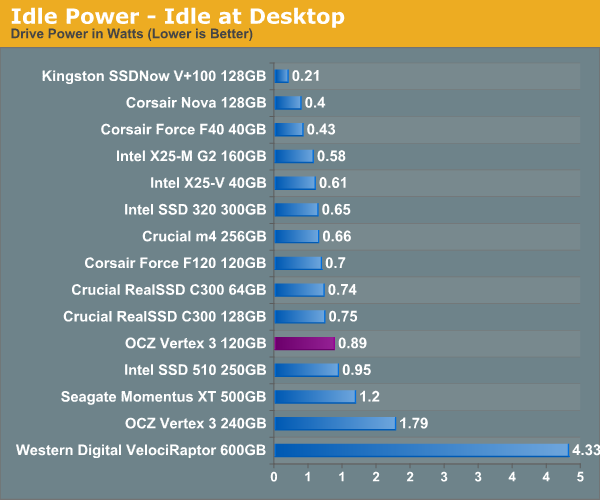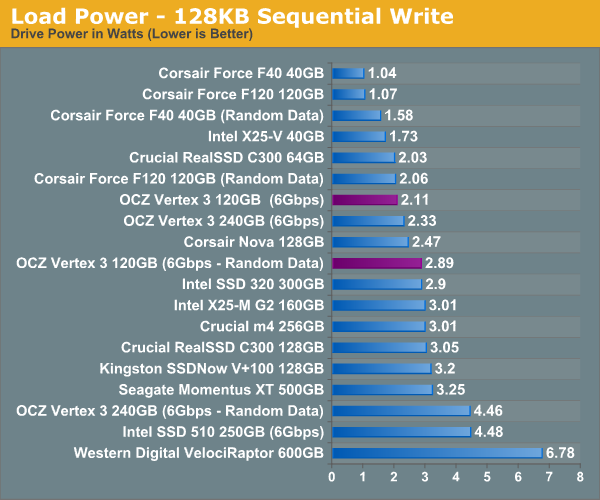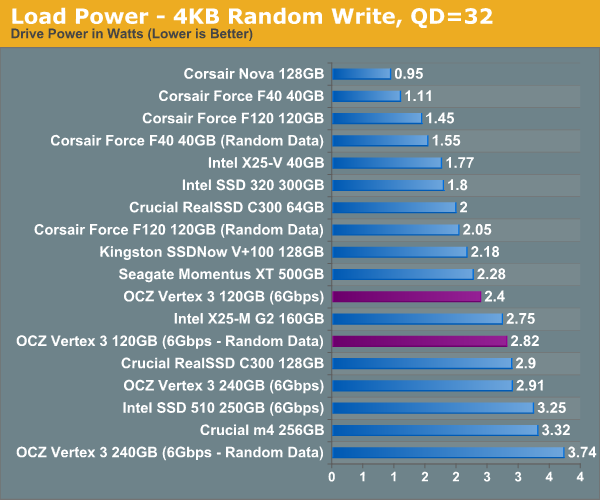The OCZ Vertex 3 Review (120GB)
by Anand Lal Shimpi on April 6, 2011 6:32 PM ESTTRIM Performance
In our Vertex 3 preview I mentioned a bug/performance condition/funnythingthathappens with SF-1200 based drives. If you write incompressible data to all LBAs on the drive (e.g. fill the drive up with H.264 videos) and fill the spare area with incompressible data (do it again without TRIMing the drive) you'll actually put your SF-1200 based SSD into a performance condition that it can't TRIM its way out of. Completely TRIM the drive and you'll notice that while compressible writes are nice and speedy, incompressible writes happen at a max of 70 - 80MB/s. In our Vertex 3 Pro preview I mentioned that it seemed as if SandForce had nearly fixed the issue. The worst I ever recorded performance on the 240GB drive after my aforementioned fill procedure was 198MB/s - a pretty healthy level.
The 120GB drive doesn't mask the drop nearly as well. The same process I described above drops performance to the 100 - 130MB/s range. This is better than what we saw with the Vertex 2, but still a valid concern if you plan on storing/manipulating a lot of highly compressed data (e.g. H.264 video) on your SSD.
The other major change since the preview? The 120GB drive can definitely get into a pretty fragmented state (again only if you pepper it with incompressible data). I filled the drive with incompressible data, ran a 4KB (100% LBA space, QD32) random write test with incompressible data for 20 minutes, and then ran AS-SSD (another incompressible data test) to see how low performance could get:
| OCZ Vertex 3 120GB - Resiliency - AS SSD Sequential Write Speed - 6Gbps | |||||
| Clean | After Torture | After TRIM | |||
| OCZ Vertex 3 120GB | 162.1 MB/s | 38.3 MB/s | 101.5 MB/s | ||
Note that the Vertex 3 does recover pretty well after you write to it sequentially. A second AS-SSD pass shot performance up to 132MB/s. As I mentioned above, after TRIMing the whole drive I saw performance in the 100 - 130MB/s range.
This is truly the worst case scenario for any SF based drive. Unless you deal in a lot of truly random data or plan on storing/manipulating a lot of highly compressed files (e.g. compressed JPEGs, H.264 videos, etc...), I wouldn't be too concerned about this worst-case scenario performance. What does bother me however is how much lower the 120GB drive's worst case is vs. the 240GB.
Power Consumption
Unusually high idle power consumption was a bug in the early Vertex 3 firmware - that seems to have been fixed with the latest firmware revision. Overall power consumption seems pretty good for the 120GB drive, it's in line with other current generation SSDs we've seen although we admittedly haven't tested many similar capacity drives this year yet.













153 Comments
View All Comments
jharmon - Monday, May 2, 2011 - link
It's been almost a month since an update in the SSD world from Anandtech. Are there any reviews on the near horizon? You said one might want to wait for a purchase until you got some of the lower capacity drives in to test to compare with the vertex 3.Thanks for all your hard work in analysis, Anand!
jharmon - Monday, May 2, 2011 - link
Maybe also address the issue with the hardware limitation from the Marvell controllers 91xx. If I understand it correctly, these will be be able to achieve the 500 MB/s. If that performance cannot be achieved, is the vertex 3 worth the premium?mrkimrkonja - Wednesday, May 4, 2011 - link
From these SSD articles I learned that TRIM is very important with SSD.I read somewhere that when you use SSD in RAID you lose TRIM support and some other things.
Is this true?
I now have 2 old ADATA SSD generation 1 in RAID0 they have 2x the performance comparing to a single drive bud they do not have TRIM anyway.
I already bought one VERTEX 2 60GB and thought buying anther one.
Always thought better more smaller disks in RAID than one big one.
If this is true I an thinking I would lose more over time without TRIM support than gain with RAID0.
Can you hal me with some info or first hand tests?
Foochey - Wednesday, May 4, 2011 - link
I would be very interested to see how the 480GB stacks up to these drives. Since these are parallel processing devices, you would think that the 480 would perform even better than the 240. Anand, any way you can get a 480 and test it? OCZ's specs look the same, so I'm guessing that they are using the smaller die chips or doing something with the way they write to the array. Any ideas? Price certainly makes the 480 out of the question for most of us, but I sure would be interested in its performance.jeffburg - Thursday, May 26, 2011 - link
OCZ Just launched the Max IOPS Version. Is that worth the extra $10? Whats the difference between the two?Palen - Thursday, June 2, 2011 - link
Thank you for another great article.In the conclusion of this article it's advised to wait for a couple of weeks to see how the vertex 3 120 GB goes againts the other 3rd generation 120GB SSD's. Is there any indication that Anandtech will be recieving / testing any of these drives in the near future?
Another thing is RAID: I've been doing some digging on SSD's, since I didn't know much about them untill last week. The general picture is starting to make sence now. Bigger is ussually faster (within certain parameters). However i'm getting conflicting information about RAID. According to some it's worth it, while others urge to stay away from RAID (no TRIM support, etc). It would be nice to have a well respected opinion in the mass of conflicting information. How would for instance 2x 60 GB SSD's do against a same type/brand 120 GB SSD? and how does the raidcontroller fit into this equation? On-board vs. professional solution?
My gut says "stay away from raid!" because the SSD's allready scale in performance depending on their storagesize. Next to that the strain that an onboard controller will put on your CPU. And paying for a professional raidcard just seems silly, with the range of SSD PCIe storage solutions. But than again, what do I know?
paul-p - Saturday, October 22, 2011 - link
After 6 months of waiting for OCZ and Sandforce to fix their firmware from freezes and BSOD's, I can finally say it is fixed. No more freezes, no more BSOD's, performance is what is expected. And just to make sure all of the other suggestions were 100% a waste of time, I updated the firmware and DID NOT DO anything else except reboot my machine and magically everything became stable. So, after all these months of OCZ and Sandforce blaming everything under the sun including:The CMOS battery, OROM's, Intel Drivers, Intel Chipsets, Windows, LPM, Hotswap, and god knows what else, it turns out that none of those issues had anything to do with the real problem, which was the firmware.
While I'm happy that this bug is finally fixed, Sandforce and OCZ have irrepairably damaged their reputation for a lot of users on this forum.
Here is a list of terrible business practices that OCZ and Sandforce have done over the last year...
OCZ did not stand behind their product when it was clearly malfunctioning is horrible.
OCZ did not allow refunds KNOWING that the product is defective is ridiculous.
OCZ nor Sandforce even acknowledged that this was a problem and steadfastly maintained it only affected less than 1% of users.
The fact that OCZ claims this bug affected 1% of users is ridiculous. We now know it affected 100% of the drives out there. Most users just aren't aware enough to know why their computer froze or blue screened.
OCZ made their users beta test the firmwares to save money on their own testing
OCZ did not have a solution but expected users to wipe drives, restore from backups, secure erase, and do a million other things in order to "tire out" the user into giving up.
OCZ deletes and moves threads in order to do "damage control and pr spin".
But the worst sin of all is the fact that it took almost a year to fix such a MAJOR bug.
I really hope that OCZ learns from this experience, because I'm certain that users will be wary of Sandforce and OCZ for some time. It's a shame, because now that the drive works, I actually like it.
paul-p - Saturday, October 22, 2011 - link
I just want to thank Anandtech for being the ONLY site out there there called out OCZ and Sandforce for having defective products. While every other hardware site out there were kissing OCZ and Sandforces butt and saying that the Vertex 3 SSD was the best thing since sliced bread, Anandtech actually was one of the only sites that actually acknowledged that there was a major bug with the sandforce controllers.I can't believe all the review sites out there were praising the Vertex 3 for almost a year when the drive had major BSOD and freezing issues. A review should be more than running a benchmark on the drive, but checking to see how the drive performs and making sure it is stable. In my eyes, every other review site showed me that they care more about the sponsors and advertising dollars than the users that visit their site. So, once again, thanks Anandtech for speaking the truth when others wouldn't.
danwat12345 - Sunday, November 13, 2011 - link
I think I'll keep my 80GB Intel X25-m G2 SSD. From your benchmarks it looks like the 120GB Vertex 3 over SATA 2 isn't that much better with random read operations than my trusty ole' 80GB Intel.I am curious if your Anandtech storagebench 2011 test were done on completely in-compressible data? The random read numbers of the Vertex 3 120GB SATA2 drive wasn't very impressive.
chainspell - Saturday, December 10, 2011 - link
you had me at page 4...tell Alex Mei (the CEO) he has my business, I just bought 2 of these on Newegg!